(1) The Cost of Being Gay in Egypt
World Voices Norway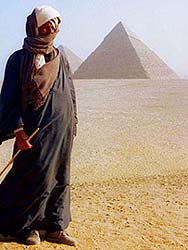
by Mukul Devichand
17 December 2001
(Updated April 2006)
Early evening in downtown Cairo, Egypt. I meet two young men in one of the hundreds of coffee shops, replete with mirror tiles and sisha pipes, that litter the streets. They are energetic and expressive, but — despite the noisy clink-clink of tea glasses around us — they speak in fearful, hushed tones. They are used to doing so because they are that most unacceptable of things in Egypt–gay men.
One of them, ‘Horus’ (he is too afraid of persecution to use his real name) describes how he was once detained and sexually harassed by police. He tells me he got off relatively easily. He describes how someone he knows was kept in prison for six months without trial, tortured daily and raped publicly by both guards and prisoners. His companion ‘Hana’ (also not his real name) agrees. “I have to live a double life, a life of fear,” he says.
Homosexuality has never been accepted in modern Egyptian culture, but in recent months State persecution of homosexuals has become more visible. On 11 May, 54 men were arrested on the Queen Boat, a night-club in a boat moored on the Nile. 52 were charged with “habitual debauchery” and “contempt of religion.” The trial of the ‘Cairo 52’ wore on for five months and was splashed around the Egyptian media where the defendants were vilified and branded as agents against the State. In mid November, judgement was finally handed down: 23 faced prison sentences of between one and five years of hard labour.
Horus became visibly distressed as he remembered the day he was detained. “They took me into a room, stripped me to my underwear and searched me,” he recalls, “and then one of them asked me if I liked sex… that way. He asked me if I like to have cock. He put his hands all over me, and on my private area, and said that he knew I liked it this way and that I shouldn’t pretend. He threatened to do things to me, to find a criminal record on me and keep me there for weeks. The other officers watched and laughed while I was humiliated.”
Horus was so frightened by the experience that for some weeks afterwards, he was afraid to even leave his home. Now he is leaving the country. “I don’t feel safe here. The doorbell rings and I think the police are coming to get me. I can’t bear everyday life anymore, I’m scared all the time and I can’t do the work I want to.”
 Being gay in Egyptian culture is difficult enough without being persecuted by the State. “Our lives are full of pretence,” Hana said. “Many gay men have a girlfriend as a front, or even get married. Only very few — a small minority of a small minority — feel they can get on and identify themselves as gay publicly.”
Being gay in Egyptian culture is difficult enough without being persecuted by the State. “Our lives are full of pretence,” Hana said. “Many gay men have a girlfriend as a front, or even get married. Only very few — a small minority of a small minority — feel they can get on and identify themselves as gay publicly.”
Recently, however, arrests and trials of gay people have become a convenient way to divert media attention away from the ailing economy. Horus told me that things began to get worse last year. “Police started surfing the net and pretending they were gay. Once they had earned your trust, they arranged to meet you somewhere. They made you think you were going on a date. Then they would arrest you.”
Egypt’s gay websites were closed down one by one, because their webmasters were either arrested or afraid of being arrested. Today, there is only one site — www.gayegypt.com–left, and it is run from abroad.
But was there any sort of strong gay community in Egypt before the recent wave of arrests? Horus believes there was. “Yes, it existed, even if the government claims that homosexuality is a recent European malaise. There were parties and gatherings, and people arranged to meet each other using websites and secret places.” He told me a story he had heard from the 1960s. “Six men were in a car, dressed in full drag, some in dresses, some in belly dancing costumes. They were stopped by police. The police looked them over carefully–and then waved them on. That would not happen today, they would no longer turn a blind eye.”
Hana disagrees with his friend, however. “There was no gay community here,” he told me. “You cannot talk about it in that way. Of course people knew about each other and met–as they do in any social ghetto. But there was no leadership, no agenda for progress.” This has begun to change after the Queen Boat trial. “People are beginning to step forward.”
The trial itself is a sign of changes in the Egyptian establishment, said Hana. “At least they are now acknowledging that we exist, if only to persecute us. The people arrested on the Queen Boat were only tortured for the first three days. After that, the eyes of the world’s human rights organisations were on them. The situation is better than it used to be. One of the guys who was arrested had been in prison for six months immediately before, where he was tortured and raped throughout the time he was there. He wasn’t even tried. This time, though, he received a trial and was found innocent.”
Throughout the Queen Boat affair, newspapers and magazines in Egypt discussed homosexuality as a Western perversion being unleashed on Egyptian soil. Horus and Hana see it differently. “In the middle ages, homosexuality was rife in Egypt, and was documented my many foreign explorers. It was only when Egyptian intellectuals began to defend accusations by European writers — who claimed that our society oppressed women and allowed immoral sex between men — that gay men began to be politically oppressed. To maintain their image in Western eyes, Egyptians and Arabs took women out of the closet and put homosexuals in it.”
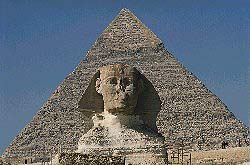 Being gay and Muslim is another conundrum for most Egyptian homosexuals. “The Qu’ran itself does not ban homosexuality,” Hana said. “The ban on homosexuality in fact goes back to Caliph Ali and is not well supported by authentic Hadiths (sayings) of the Prophet,” he said.
Being gay and Muslim is another conundrum for most Egyptian homosexuals. “The Qu’ran itself does not ban homosexuality,” Hana said. “The ban on homosexuality in fact goes back to Caliph Ali and is not well supported by authentic Hadiths (sayings) of the Prophet,” he said.
In the wake of the September 11 attacks on New York, international attention is being focused increasingly on Egypt and the Arab world — though the status of homosexuals is largely ignored. Nevertheless, Hana told me that the beginnings of a gay movement are beginning to emerge. “On 15th August this year, Al-Fatiha (a gay Muslim group based in the USA) called for a global show of solidarity for the ‘Cairo 52’. 60 organisations on four continents, from Uganda to Brazil, took part. This gives us confidence.”
Neither Horus nor Hana see big changes on the immediate horizon, however. “This society does not even allow pre-marital sex,” Horus pointed out. Hana said that “Egyptian society needs to push for freedoms and rights across the board, such as a recognised right to intimacy. I don’t feel more victimised than other marginal groups, like women. In fact, I feel like a political dissidents.” He is right. In Egypt, more now than ever, being gay is a political rebellion that can cost very dearly indeed.
World Voices Norge – post@worldvoices.no
(http://www.worldvoices.no/nyhet/gayinegypt.asp)
Mukul Devichand can be reacheds by e-mail at: mdevichand@hotmail.com
(2) Homosexuality on Trial in Egypt
The Guardian, London
by Brian Whitaker
November 19, 2001
Same-sex relationships are as common in the Middle East as in Europe, but the difference is public perceptions,
In 1800, a European traveller to Egypt wrote: “The inconceivable inclination which has dishonoured the Greeks and Persians of antiquity constitutes the delight, or, more properly speaking the infamy of the Egyptians … the contagion has seized the poor as well as the rich.”
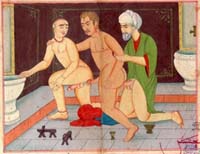 The “contagion” in question was spelled out more bluntly by an earlier writer, Thomas Sherley, describing the Turks: “For their Sodommerye they use it soe publiquely and impudentlye as an honest Christian woulde shame to companye his wyffe as they do with their buggeringe boys”.
The “contagion” in question was spelled out more bluntly by an earlier writer, Thomas Sherley, describing the Turks: “For their Sodommerye they use it soe publiquely and impudentlye as an honest Christian woulde shame to companye his wyffe as they do with their buggeringe boys”.
A 17th century French visitor to the Middle East went so far as to claim that Muslims were bisexual by nature, and numerous male authors gave descriptions of “licentiousness” (i.e. lesbianism) among women in harems and bath houses that they could not possibly have witnessed.
In those days, homosexuality was known in Britain as the “Persian” or “Turkish” vice. That image of the Middle East has never entirely disappeared, and first-time visitors today are often struck by the sight of men, sometimes even soldiers in uniform, strolling along a street hand in hand.
The mistake here is to imagine that spoken language is the only gulf between cultures. Body language and customs also need translating if they are not to be misunderstood.
Confused signals can, of course, travel in both directions. A handbook issued to western students by the American University in Cairo warns: “Earrings on men are considered to be a sign of homosexuality”.
A Jordanian (who had never visited Britain) once informed me that London is full of discos where “girlboys” dance together. Such behaviour, naturally, is known to many Arabs as the “English” vice.
The truth of the matter, so far as anyone really knows, is that same-sex relationships are neither more nor less common in the Middle East than anywhere else–though attitudes towards them differ.
Although Islam strongly disapproves of sex between men, Muslim societies have generally been tolerant in practice, especially where relationships are discreet. One of the most celebrated poets of classical Arabic literature indulged in wine and young men in equal quantities, but literary merit seems to have excused his behaviour.
The relatively open and liberal attitudes in much of the Arab world obviously came as a great shock to the straight-laced European travellers of the 18th and 19th centuries. The first people in Egypt to demand a law against homosexuality were the British, during the colonial period.
Curiously, though, over the last few decades, these positions have been reversed. Europe and North America have become more liberal towards homosexuality while some of the Arab countries have become more conservative–possibly in order to appease Islamic militants.
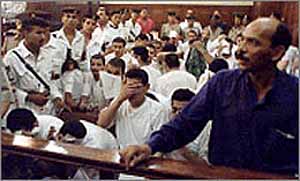 Last week, in the biggest gay trial that Egypt has ever seen, 23 men were sentenced to between one and five years’ imprisonment for “debauchery” (since homosexuality itself is not illegal). Twenty-nine others, who had been held in jail for six months awaiting trial, were acquitted.
Last week, in the biggest gay trial that Egypt has ever seen, 23 men were sentenced to between one and five years’ imprisonment for “debauchery” (since homosexuality itself is not illegal). Twenty-nine others, who had been held in jail for six months awaiting trial, were acquitted.
In advance of the trial, Egyptian newspapers published the full names and addresses of the accused –who included a university professor, three doctors and a lawyer–so there is little chance that those who were cleared will be able to return to a normal life.
The case began last May with a police raid on the Queen Boat, a floating disco on the Nile in Cairo, which was known as a gay–but not exclusively gay–venue. A number of women who inconveniently happened to be on board were allowed to go free.
Egypt’s popular media reported the affair with a mixture of homophobia and xenophobia. Homosexuality, in their eyes, is a foreign phenomenon–an illness that Egyptians, if they are not careful, risk catching from westerners. Having caught it they may, in the words of one newspaper, go on to “infect others”, thus threatening the Egyptian way of life.
It therefore came as no surprise that the central figure in the case, 32-year-old Sherif Farahat, was said to have been a regular visitor to the gay fleshpots of Europe and–adding a touch of regional politics–Israel.
To highlight the danger to the nation, the case was not heard in an ordinary court but in the state security court, specially set up some years ago to deal with suspected terrorists. The front-page headline of a Cairo newspaper reinforced this view: “Perverts declare war on Egypt”.
 Although novels by famous Egyptian writers, such as Nobel Prize winner Naguib Mahfouz, and several films portray gay characters living normally in society and causing no public outcry, it has never been easy to be gay in Egypt. In poor areas, men who seem feminine or act in a camp manner are ridiculed and sometimes beaten.
Although novels by famous Egyptian writers, such as Nobel Prize winner Naguib Mahfouz, and several films portray gay characters living normally in society and causing no public outcry, it has never been easy to be gay in Egypt. In poor areas, men who seem feminine or act in a camp manner are ridiculed and sometimes beaten.
Gay characters in modern Arab novels and films usually meet with unhappiness or tragedy. Their sexual relationships with foreigners are often a metaphor for western domination or Arab revenge against it.
One popular explanation for same-sex relationships among young people in the Middle East is that those involved are not really gay, but social insistence on the virginity of unmarried women drives them to seek other outlets.
This is simply not true, according to one Egyptian gay activist who asked to be known only as Ahmed. “Heterosexual sex is freely available,” he said. “Women who need to be virgins can have an operation to restore their virginity before they marry. It’s very simple and quite cheap.” (The cost is normally less than £200.)
It is much more common, he said, for gay young men to be forced into marriages they do not want. Those who display the wrong inclinations are likely to be beaten by their fathers until they find a wife or run away from home. In better-off families they may be sent for a “cure”. Ahmed told of a friend whose father discovered he was having a gay relationship and, after a beating, bundled him off to a psychiatrist.
“The treatment involved showing him pictures of men and women and giving him electric shocks if he looked at the men,” Ahmed said. “After a few weeks of this he persuaded a woman to pretend to be his girlfriend. His father was happy for a while – until he found a text message from the boyfriend on his son’s mobile phone.”
The beatings started again and the young man fled to the United States.
No one is absolutely sure what prompted the recent mass trial in Cairo, but it seems that the internet played a part.
While discreet gay relationships are tolerated in Egypt up to a point, concepts such as “gay identity” and “gay lifestyle” are not recognised. There has never been a “gay community” of the kind found in many western cities.
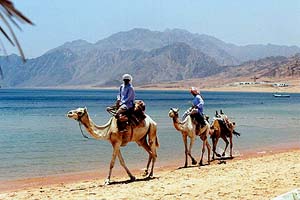 This began to change in Egypt with the arrival of the internet. Websites and email lists allowed previously isolated gays to make contact and tell each other about social events.
This began to change in Egypt with the arrival of the internet. Websites and email lists allowed previously isolated gays to make contact and tell each other about social events.
About the same time, the Egyptian police set up a special internet crimes unit. With internet use mainly confined to the country’s law-abiding middle classes, there was little real work for them to do, but they needed to show results and spotted a few international dating sites where Egyptian men were seeking to meet other men.
“Some found themselves invited out for a date and got arrested when they turned up,” one man said. In February, a computer engineer was jailed for 15 months and an accountant for three months for having committed a “scandalous act” –advertising sexual services on the web.
Many Egyptian gays believe the government has cracked down because they were starting to come into the open. Ahmed Ghanem, a western-educated film director, says that the internet made it easier to find gay hangouts, and many upper-class gays no longer felt a need to hide.
“This has led to a negative reaction among ordinary Egyptians who do not believe that sex is something to speak about in public,” he says. Meanwhile,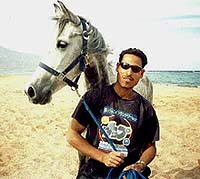 half a dozen Egyptian gay websites have closed down, leaving only gayegypt.com, which is registered in London and uses a server in California. It carries a warning on its home page that visitors may be monitored by the Egyptian authorities.
half a dozen Egyptian gay websites have closed down, leaving only gayegypt.com, which is registered in London and uses a server in California. It carries a warning on its home page that visitors may be monitored by the Egyptian authorities.
The gay emailing lists, in turn, have been deluged with “unsubscribe” messages. Since the arrests, one has dropped from 300 subscribers to nine (of whom only six are Egyptians).
Thanks to Khaled Dawoud, the Guardian’s correspondent in Cairo, for assistance with this article.
Email the author at: brian.whitaker@guardian.co.uk
(3) Egypt uses Web to snare suspected gays
March 27, 2003
by Tom Musbach, Gay.com / PlanetOut.com Network
http://www.glapn.org/sodomylaws/world/egypt/egnews154.htm
A day after the U.S. Supreme Court began deliberating about decriminalizing gay sex between consenting adults, Egypt continues to aggressively seek – often through Internet chat rooms – and punish men who are suspected of being gay.
On Jan. 16, a Lebanese man named Wissam Abyad was entrapped on a gay Web site by an undercover agent posing as a Spaniard who was new to Cairo and looking for friends. Abyad, 26, agreed to meet the man and was then arrested, charged with “debauchery,” advertising “against public morals” and inciting others to debauchery. He was sentenced to 15 months in prison.
The incident is one of several during recent months in what Human Rights Watch (HRW) has called an “increasingly harsh campaign of entrapment and arrest of men solely on the basis of alleged consensual homosexual conduct.” “The police are raiding private homes and using the Internet to entrap men on trumped-up charges of ‘debauchery,'” said Joe Stork, the Middle East/North Africa director for HRW. “People looking for support and community find a prison cell.”
Abyad’s partner, who requested anonymity, said via e-mail that he knows of three other men who were similarly entrapped since Abyad’s arrest, as well as 13 more who were arrested in private homes. The trial of those 13 men began on Thursday. “This is truly a witch hunt,” Abyad’s partner said.
According to Abyad’s partner, Abyad refused meetings twice after chatting via Gaydar with the agent posing as the lonely Spaniard, but he finally “felt sorry for him” and agreed to meet for lunch. When he arrived at the arranged meeting spot, a McDonald’s restaurant, four undercover cops arrested him.
Last year, a 23-year-old Egyptian man was sentenced to three years in prison after he tried to meet another man he had chatted with online.
The recent arrests follow the nearly two-year ordeal of 52 suspected gay men who were arrested in May 2001 on a floating nightclub, tried over several months under harsh and humiliating circumstances and then retried in a different court. Two weeks ago, the retrial ended with three-year jail sentences imposed on 21 of the men; 29 were acquitted. (The two “leaders” were sentenced last year and not subjected to retrial.)
Abyad’s case was recently defeated in an appeals court. He and his partner – who have lived together in Cairo for two years – are working on an appeal to Egypt’s highest court. Earlier this week, Abyad was transferred from the crowded appeals jail, where he lived in a cement room without running water or a toilet. Abyad’s partner has not yet been able to visit Abyad in the new prison north of Cairo, which is supposedly for foreign prisoners. He said Abyad had not been harmed with physical violence in prison.
Amnesty International, which has spoken out against Egypt’s treatment of suspected homosexuals, declared Abyad a “prisoner of conscience.”
Recent documentary films about LGBT in the Middle East:
‘I Exist’: http://www.unlearninghomophobia.com/iexist_presskit/IExist.Info.pdf
‘Dangerous Living’: http://www.afterstonewall.com/dangerous.html
Also see:
Islam and Homosexuality
Gay Egypt Stories
Gay Egypt News & Reports (2001-Present)
Gay Egypt Photo Galleries
















